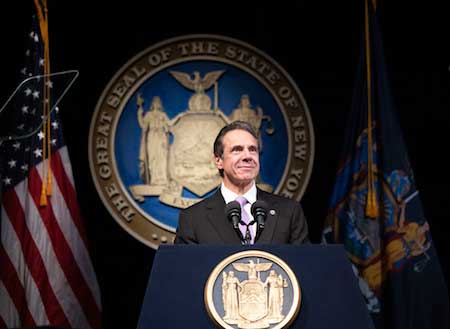Governor presents $178 billion budget proposal
Expanded free college tuition, increase in school spending and $300 million to Reimagine the Erie Canal among the goals

Photo by Mike Groll/Office of the Governor: Governor Cuomo delivers his Fiscal Year 2021 Executive Budget address in Albany today.
Governor Andrew Cuomo today outlined a $178 billion Executive Budget which features a $33 billion five-year plan to combat climate change, including a new plan to streamline government bureaucracy to deliver renewable energy projects faster; a $25 billion expansion of New York’s largest-in-the-nation building program, bringing it to $275 billion; $28.5 billion investment in education (up 3 percent or by $826 million) while reforming funding formulas to prioritize support for poor schools; and an expanded Excelsior free college tuition program to include families making up to $150,000 per year.
The Executive Budget also includes a new proposal to protect our democracy by banning foreign-influenced corporations from making campaign contributions; the most funding in the state’s history – an additional $64 million – to provide services to people who are homeless, including those with mental illness; investments to combat child poverty and $157 million to expand the Empire State Child Tax Credit, serving 400,000 families with children under 4 years old; and an additional $25 million funding to harden security infrastructure at non-public schools and cultural organizations vulnerable to hate crimes.
The budget plan will also promote public health with proposals to ban the sale of flavored e-cigarettes and cap insulin co-payments at $100 per month. It will continue New York’s unprecedented economic and social progress by continuing middle class tax cuts for 4.7 million New Yorkers making under $300,000 a year; cutting small corporate business taxes, benefiting 36,000 taxpayers and saving them $35 million; enacting the strongest Paid Sick Leave program in the nation, impacting 1.3 million New Yorkers; closing the rape intoxication loophole; expanding banking services for low-income people; and proposing an inclusive Equal Rights Amendment.
The Governor’s proposal will reform the current Medicaid system with a new Medicaid Redesign Team co-chaired by Michael Dowling of Northwell Health and labor leader Dennis Rivera. The MRT II will work to reform the program and identify $2.5 billion in savings this year by finding industry efficiencies or additional industry revenue with zero impact to beneficiaries.
For the 10th consecutive year, the Executive Budget is balanced and continues the state’s record of fiscal integrity, the governor said.
“We’re proposing historic investments in climate change and infrastructure programs and fixing the school aid formula to ensure poorer schools get the funding they need,” Governor Cuomo said. “We’re tackling the division and hate that has spread like a cancer in the body politic by funding new security measures for organizations targeted by hate crimes, protecting our democracy from foreign-influenced corporations, and addressing homelessness, child poverty and other barriers facing low-income New Yorkers.”

Photo by Darren McGee/Office of the Governor: Andrew M. Cuomo goes over a $178 billion budget proposal today.
Some other highlights of the budget include:
• Requiring Public Officials to Disclose Their Tax Returns: Governor Cuomo will propose the “Nothing to Hide” Act in the FY 2021 Executive Budget to make our government the most transparent in the nation. The law will require that the Governor, the Lieutenant Governor, the Attorney General, the Comptroller, every state commissioner and every Assembly Member and Senator make their tax returns public. Further, any elected official in the State with a government salary over $100,000 a year will have to do the same.
• New School Aid Funding Formula: Since 2012, New York State has increased funding for education by 43 percent, and this year the Governor’s main goal is to ensure education equity. In 2019 the Governor mandated that districts disclose the amount of funding distributed to each individual school. However, wealthier school districts still spend approximately $36,000 per student as opposed to $13,000 per student at poorer school districts. To ensure State funds are used to reduce funding disparities, the FY 2021 Budget will increase School Aid by $826 million, bringing the total annual investment to a record $28.5 billion, with 85 percent of the Foundation Aid increase going to the highest-need districts. To further prioritize poorer schools and ensure education equity, the Governor is proposing a new School Aid Funding Formula to properly distribute funds and build up underserved school districts.
• Continuing Middle Class Tax Cuts: Governor Cuomo will continue to lower Personal Income Tax rates for middle-class New Yorkers. In 2020, the third year of the multi-year tax cuts enacted in 2016, income tax rates have been lowered from 6.85 percent to 6.09 percent for taxpayers in the $43,000-$161,550 income bracket, and to 6.41 percent in the $161,550-$323,200 income bracket. These cuts are expected to save 4.7 million New Yorkers over $1.8 billion this year. Furthermore, income tax rates will continue to drop to 5.5 percent for taxpayers in the $27,900-$161,550 tax bracket and 6 percent in the $161,550-$323,200 bracket. When the cuts are fully phased in, middle class taxpayers will have received an income tax rate cut up to 20 percent, amounting to a projected $4.2 billion in annual savings for six million filers by 2025. As the new rates phase in, they will be the State’s lowest middle-class tax rates in more than 70 years.
• Lowering Tax Rates by 40 Percent for Small Businesses: To continue the State’s robust economic growth and record of job creation, Governor Cuomo will enact comprehensive tax relief for small businesses, including reducing the corporate tax rate for small businesses from 6.5 percent to 4 percent, which will benefit 36,000 taxpayers and save them $35 million.
• Establishing Paid Sick Leave for Working New Yorkers: To further empower New York’s low-wage workers and protect all consumers in the State, Governor Cuomo will enact paid sick leave. Businesses with five to 99 employees will provide their employees at least five days of job-protected paid sick leave per year and businesses with 100 employees or more will provide at least seven days of paid sick leave per year. Smaller businesses, with four or fewer employees, will guarantee five days of job-protected unpaid sick leave to their employees every year. Small businesses already providing paid sick leave will be able to so.
• Expanding Free College Tuition to More Middle Class Families: To expand the transformational opportunity of the Excelsior Scholarship to more middle class families, Governor Cuomo is proposing to raise the Excelsior eligibility threshold from $125,000 to $150,000 of adjusted gross family income for New York’s families. By increasing the threshold, more than 230,000, or nearly 58 percent of New York resident students will go to a SUNY or CUNY college tuition free.
• Banning Single Use and Packaging Styrofoam Products: To build on the progress of last year’s plastic bag ban, the Governor is proposing new legislation to prohibit the distribution and use of expanded polystyrene, commonly known as Styrofoam, single-use food containers and packaging materials by January 1, 2022.
• Reimagining the Erie Canal: Building on the findings of the Reimagine the Canal Task Force, the New York Power Authority, which now oversees the Canal Corporation as a subsidiary, will invest $300 million over the next five years to integrate the Empire State Trail and Erie Canal through a new program that will stimulate tourism and economic development, address environmental challenges unknown a century ago, and create an asset that will improve the quality of life in communities along the 360-mile spine of the Erie Canal.
A first phase of funding will start this year that will have two parts: a $100 million economic development fund to invest in communities along the Canal and a separate $65 million investment in solutions that will help prevent ice jams and related flooding in the Schenectady area. The remaining $135 million of the plan’s funding will subsequently be allocated to research recommended by the Reimagine Task Force, as well as to solutions related to flood mitigation, invasive species prevention and ecosystem restoration.
• Launching Next Round of the Downtown Revitalization Initiative: The Downtown Revitalization Initiative is transforming downtown neighborhoods into vibrant communities where the next generation of New Yorkers will want to live, work and raise families. Participating communities are nominated by the State’s ten REDCs based on the downtown’s potential for transformation. Through four rounds of awards, each winning community was awarded $10 million to develop a downtown strategic investment plan and implement key catalytic projects that advance the community’s vision for revitalization. The FY 2021 Executive Budget provides $100 million for a fifth round of the Downtown Revitalization Program.
• Legalizing Cannabis: This year Governor Cuomo is proposing a comprehensive regulatory approach to legalize cannabis, creating a new Office of Cannabis Management to specialize in cannabis regulation – overseeing the medical, adult-use and hemp programs. The proposal will administer social equity licensing opportunities, develop an egalitarian adult-use market structure and facilitate market entry through access to capital, technical assistance and incubation of equity entrepreneurs. The proposal will also correct past harms to individuals and communities that have disproportionally been impacted by prohibition. To safeguard public health, the proposal limits the sale of cannabis products to adults 21 and over and establishes stringent quality and safety controls including oversight over the packaging, labeling, advertising and testing of all cannabis products.





































































